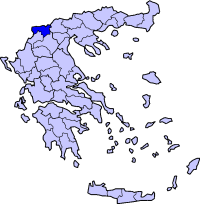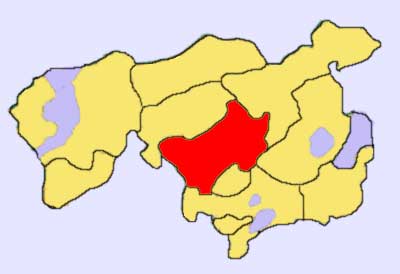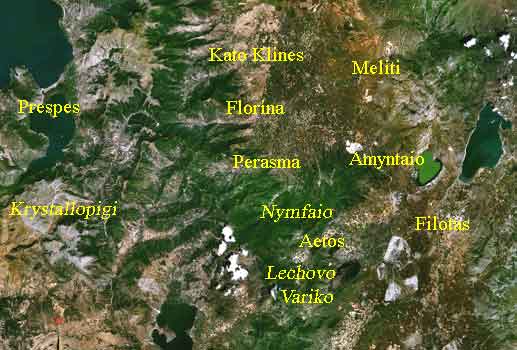.
Administrative Region : West Macedonia
Regional unit : Florina


Perasma (Greek: Πέρασμα; Slavic: Кучковени or Кучкојни, Kučkoveni or Kučkojni, Greek: Κουτσκοβαίνη, Koutskovaini [1]) is a village and a former municipality in Florina regional unit, West Macedonia, Greece. Since the 2011 local government reform it is part of the municipality Florina, of which it is a municipal unit.[2] It is located in a plain, 6 km southeast of Florina. The population was 5,510 in 2001.
Geography
Perasma is neighboured by the villages of Ammochori, Skopia, Kolchiki, and Tropaiouchos.
Etymology
Before the Hellenisation of the village name in 1926 , the village was locally known as Kučkoveni or Kučkojni. The name has said to come about during the 15th century. Kučko in the local Slavic dialect means female dog, which depicts a tale that has been passed down from the great forefathers of the region: [3]
Originally, there was a church that was situated just north of the initial village (which was back then known as Krušovo). During this time, the locals believed that their village and people were under a so called curse which resulted with many dying, and with the reason unknown. (Florinian historians have now concluded that the reason was most-likely Malaria). One day, a female dog ironically ran past the village's church and had ten little babies, all of whom were extremely healthy and nurtured by their mother. A male villager, who was making his way to worship in the church, found the female dog and her babies. The man was astonished about what he had saw, which was perhaps a sign of healthy life, so went back to the main village in order to explain to the others. Once the locals heard, they finally believed that the area was truly blessed by their great monastery. So, as time went on, they finally decided to burn down the original village and create a new one north of the church, and see if this "curse" would of subsided. From them on this plague which killed nearly everything in the region had stopped and the population overall grew miraculously.
The new Greek name for the village, Perasma, directly translates to pathway. In some other historical documents, the name in Greek has also been Skylochori meaning dog village. [4]
History
The settlement was first mentioned in an Ottoman defter of 1481, under the name of Kučkovjani, and was described as having sixty-seven households. The locals of the village produced many freshly-grown crops that were kept or sold in the Florinian markets, like garlic and onions.[5]
The village, during the Ottoman Empire, was under the Church Dioscese of Kastoria, where their main monastery, Agioi Anargyroi, was built in 1300.
Throughout the rise of Bulgarian nationalism in Macedonia, and the newley created Bulgarian Exarcharte in the 1870s, Andrej Tošev (Bulgarian council from Monastir) notes that Kučkojni was still under the Patriarchate up until 1902. After that, a great amount of Kučkovci (Slavic: Кучковци, Greek: Κουτσκοβίτες, Koutskovites - meaning people of Kučkoveni/Kučkojni) followed the Bulgarian cause. As a result of this, the village created such revolutionary figures as Delyo Stoeff - the Florina leader of the Bulgarian-Macedonian Revolutionary Organization. Though this is a fact, a few villagers still sided with the makedonomachoi and Hellenes during battle, such as Nikolaos Rapos.[6]
The first school of the village taught the Greek language to the pupils, and before 1912, included the following teachers: A. Kousmanis from the village of Skopia, G. Konstantinidis, K. Gitskalis, P. Klekatsis, G. Papadimitriou from Perasma and Papanousis from Drosopigi.[7]
During the Nazi occupation of Greece in World War II, the Germans placed a Bulgarian council in Perasma, which consisted of local people from the village such as Kosta Nedelkoff, Todor Popdimitroff, Nase Gagapoff, Iliya Popstoyanoff, Dimitriya Kincharoff, Pandel Gichkaloff, Nikola Popstoyanoff, Iliya Pirganoff and Boris Nedelkoff.[8]
Churches
Perasma currently has 3 churches, which are Agia Paraskevi, Agioi Anargyroi x2. Agioi Anargyroi is the oldest house of worship in the village, and was built in 1300 A.D. The church feast and celebration is held on the first of November each year.
References
^ http://pandektis.ekt.gr/pandektis/handle/10442/171854
^ Kallikratis law Greece Ministry of Interior (Greek)
^ Oral tales and history of the village
^ Historical Research
^ Kravari, Vassiliki (1989) (in French). Villes et villages de Macédoine occidentale. Realites byzantines. 2. Paris: Editions P. Lethielleux. p. 290. ISBN 2-283-60452-4.
^ Historical Insight
Greece :
A - B - C - D - E - F - G - H - I - J - K - L - M -
N - O - P - Q - R - S - T - U - V - W - X - Y - Z
| Ancient Greece
Science, Technology , Medicine , Warfare, , Biographies , Life , Cities/Places/Maps , Arts , Literature , Philosophy ,Olympics, Mythology , History , Images Medieval Greece / Byzantine Empire Science, Technology, Arts, , Warfare , Literature, Biographies, Icons, History Modern Greece Cities, Islands, Regions, Fauna/Flora ,Biographies , History , Warfare, Science/Technology, Literature, Music , Arts , Film/Actors , Sport , Fashion --- |
Retrieved from "http://en.wikipedia.org/"
All text is available under the terms of the GNU Free Documentation License



